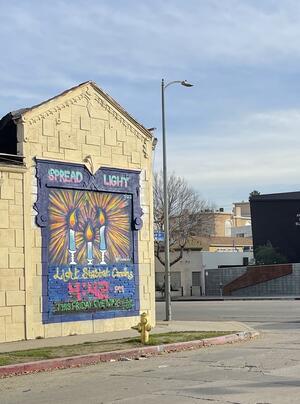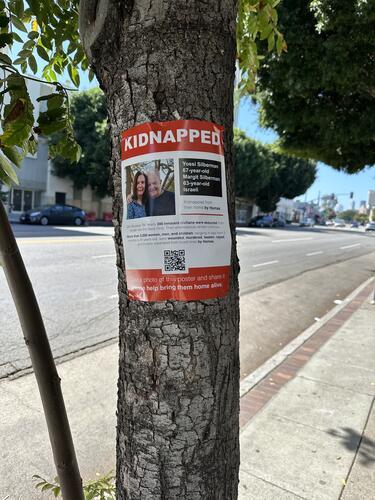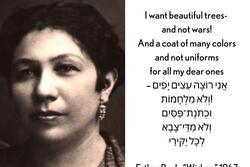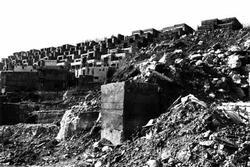My Neighborhood is Now a House of Mourning
A little over two weeks ago, I had an essay in the LA Times. It was a big deal not only because it was the LA Times, but because it was about my beloved neighborhood, Pico-Robertson, a predominantly Orthodox Jewish neighborhood in the heart of Los Angeles.
In the piece, I described what it was like growing up in a place where I never felt like a minority as a Jew, where tallit bags are as commonplace as Macbooks in a Starbucks. It’s a tight-knit, religiously observant community, one where I am the odd one out for driving on Shabbat (though I still go to synagogue most Saturdays). I wrote about how much I valued having this neighborhood as a home within such a massive city, how when friends visit, they comment on how lucky I was to grow up in such a place.
Little did I know that the beautiful neighborhood I had praised in print would soon turn into a house of mourning.
I found out about the attacks shortly before I got to synagogue on Saturday, October 7. The fear and panic were immediate: Was my family in Israel okay? Were my friends okay? Was history repeating itself?
Because many people in my community go offline on Shabbat, others showed up to services unaware of what had happened. I saw security officers explaining to congregants why there were suddenly more police officers patrolling the area. Congregants and service leaders cried openly. People asked: How can we do Hallel? How can we recite the verses praising Hashem with what is currently unfolding in Israel?
That night, I went to an event for Jews in their 20s and 30s at a different synagogue. I had already planned to go, and knew that it would feel good to be around fellow Jews, even though the celebration of Simchat Torah felt incongruous with the tragedy of the day. While there, I interacted with old friends and met new people. I watched as we all tried to figure out how much to mention the events of the day. Because it was still a holiday—the end of Shabbat was followed immediately by Shemini Azeret—there were some people who only knew the most basic details of the attack by Hamas, and even some who didn’t yet know that there was a war going on. Those of us who knew explained in staccato sentences.: Israel is at war. There was a coordinated attack by Hamas. The intelligence had no knowledge of it. It’s being compared to 9/11 or Pearl Harbor. People are being called up from the reserves. There was a music festival and . . .
Walking around the day after the attack, I was stopped by people who were still offline, asking me questions about the news: What do you know? Is the airport open? How many are dead now? Any updates? What about Ashkelon? Ashdod? Sderot? Tel Aviv? Okay, thank you, chag sameach.
On Sunday night, there was a vigil for the Jewish community of LA, the one that I hold closest to my heart. Now that Shabbat and the holidays were over, cars lined the streets and people shuffled into the synagogue on a hill. There were so many cars that it took thirty minutes just to get up the street. The synagogue echoed with sobs and people held each other close as we sang Oseh Shalom. By now, we had all seen the images and videos coming out of Israel: some over the last 36 hours, others only in the hours since sundown, the shock still settling in. It was reminiscent of the pogroms, and we needed one another.
Over the next few days, I started to notice people carrying themselves differently as they processed the news. Shoulders stooped, walking pace slowed, faces were streaked with tears.
There is no precedent for an attack like this in Israeli history. There is no precedent for dealing with this online and having information come in at the speed of light, seeing horrific images once relegated to battlefields, and witnessing hate and denial on display in real time. It reminded me of an incident from this past May, when I received a deeply antisemitic email about a story that I had helped distribute, filled with slurs and allusions to the Holocaust. With the hateful rhetoric now circulating, I can’t help but feel some of the same anxiety and fear that came with that email—only now it’s heightened.
In the hours and the days since we first learned of the attack, the word that keeps echoing in my head is “inexplicable.” The lack of humanity is inexplicable. The mental gymnastics that I saw (and continue to see) online, the lengths that people will go to to justify the attacks by Hamas, are inexplicable. The fear that I feel as a Jew in the United States is deeply rooted in my ancestry, but it is still inexplicable. Pico Boulevard, lined with kosher bakeries and restaurants, is also suddenly papered over with signs about those who were kidnapped, seeking information. As I find out that friends of friends have been kidnapped and murdered, I am reminded of how small the Jewish world is. This sliver of the world’s population has been shaken to its core.
“How is your family?” I find myself asking Israeli shopkeepers on Pico Boulevard.
“Okay physically, Baruch Hashem [thank God],” they tell me in Hebrew. “They’re going to the shelters and they’re terrified.”
I don’t know where we go from here. I don't know how my neighborhood will transform in the coming days and weeks. I don’t know the ways that antisemitism might wash up on our shores. I know that our hearts are forever broken. I know that October 7 is burned into the memories of Israelis and Jews worldwide, and I know that this attack is a reminder of the way that we hold our fellow Jews in our hearts. For my community, and for Jewish communities all over the world, I hope that there is a way to find joy in the small moments, to find connection with others, and to see one another’s humanity.









Beautifully written reflection on how the events in Israel are impacting the Jewish community here in Los Angeles. Thank you 💙
Well said sweet pea, hearts are breaking everywhere. Words just excape me.